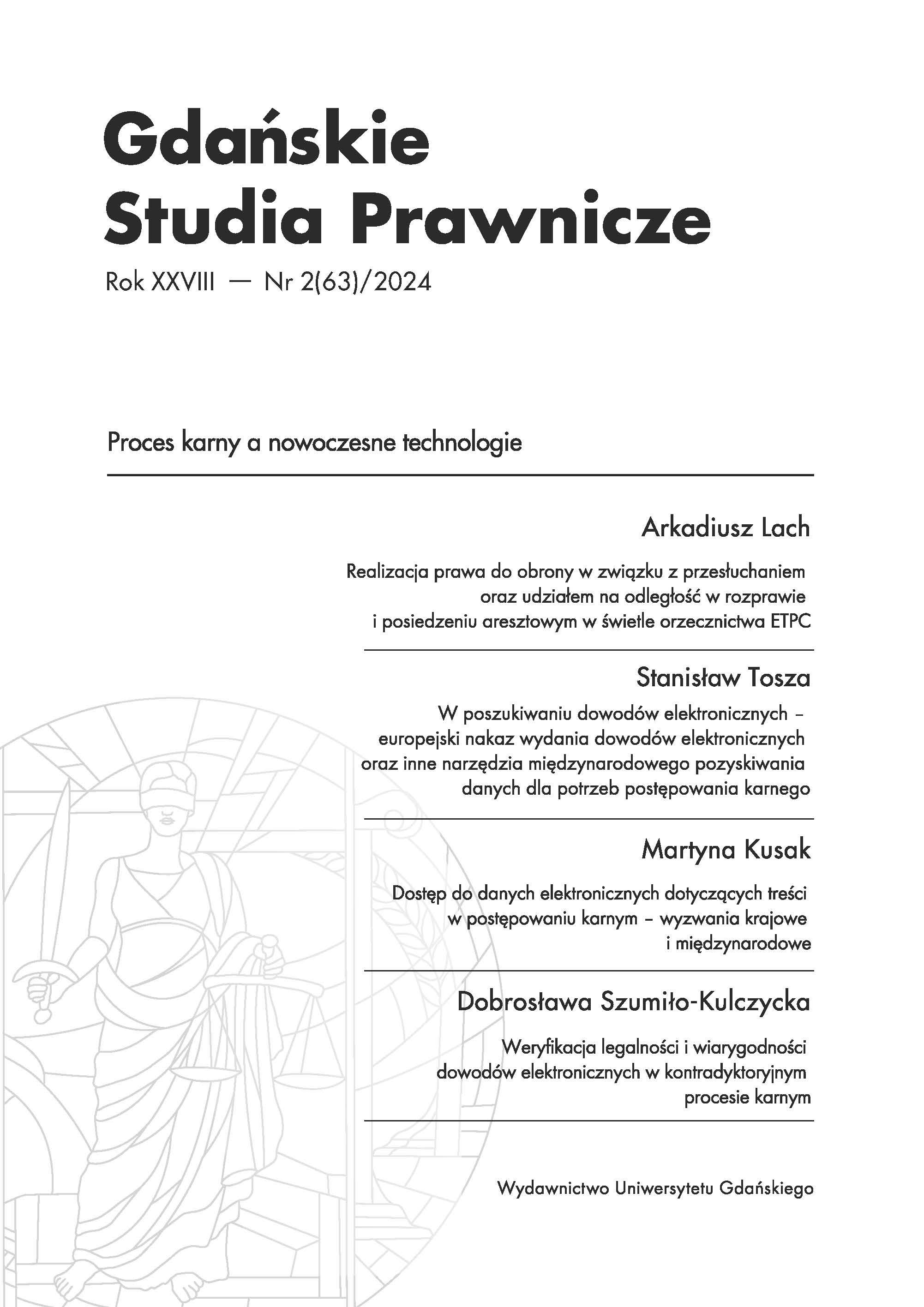Zdalny udział podejrzanego w posiedzeniu aresztowym w świetle standardu habeas corpus
DOI:
https://doi.org/10.26881/gsp.2024.2.08Słowa kluczowe:
habeas corpus, posiedzenie aresztowe, wideokonferencja, zdalny udziałAbstrakt
Glosa porusza problem dopuszczalności zdalnego udziału podejrzanego w posiedzeniach aresztowych, a w szczególności w posiedzeniu w przedmiocie rozpoznania wniosku o zastosowanie izolacyjnego środka zapobiegawczego, z punktu widzenia art. 5 ust. 3 i 4 EKPC. Dokonując analizy orzecznictwa strasburskiego, autor dochodzi do wniosku, że specyfika zdalnego udziału w zbyt daleko idącym stopniu negatywnie wpływa na możliwość zrealizowania celów wyznaczonych przez procedurę habeas corpus, wobec czego należy stwierdzić, że postawienie przed sędzią w rozumieniu art. 5 ust. 3 EKPC powinno mieć charakter fizyczny. Zdaniem autora, zdalny udział podejrzanego może jednak stanowić optymalne rozwiązanie w przypadku pozostałych posiedzeń aresztowych. Autor zwraca również uwagę na potrzebę przyjęcia dodatkowych gwarancji procesowych związanych ze zdalnym udziałem podejrzanego w posiedzeniu i formułuje wnioski de lege ferenda.
Downloads
Bibliografia
Bannon A., Adelstein J., The Impact of Video Proceedings on Fairness and Access to Justice in Court, Brennan Center for Justice 2020, https://www.brennancenter.org/our-work/research-reports/impact-video-proceedings-fairness-and-access-justice-court.
Dukała K., Fryda M., Psychologiczne i prawne aspekty przesłuchania z wykorzystaniem wideokonferencji [w:] Człowiek zalogowany, 3, Różnorodność sieciowej rzeczywistości, red. K. Tucholska, M. Wysocka-Pleczyk, Kraków 2014.
European Criminal Bar Association (ECBA) Statement of Principles on the Use of Video-Conferencing in Criminal Cases in a Post-Covid-19 World, „New Journal of European Criminal Law” 2021, vol. 12, no. 3.
Fortuna Cimino E., Makar Z., Novak N., Charm City Televised & Dehumanized: How CCTV Bail Reviews Violate Due Process, „University of Baltimore Law Forum” 2014, vol. 45, no. 1.
Gori P., Pahladsingh A., Fundamental Rights under Covid-19: An European Perspective on Videoconferencing in Court, „ERA Forum” 2021, vol. 21, no. 4.
Gourdet C. et al., Court Appearances in Criminal Proceedings Through Telepresence: Identifying Research and Practice Needs to Preserve Fairness While Leveraging New Technology, RAND Corporation Research Report 2020.
Hynes J., Gill N., Tomlinson J., In Defence of the Hearing? Emerging Geographies of Publicness, Materiality, Access and Communication in Court Hearings, „Geography Compass” 2020, vol. 14, no. 9.
Interntional Commission of Jurists, Videoconferencing, Courts and COVID-19. Recommendations Based on International Standards, November 2020, https://www.unodc.org/res/ji/import/ guide/icj_videoconferencing/icj_videoconferencing.pdf.
Kamber K., The Right to a Fair Online Hearing, „Human Rights Law Review” 2022, vol. 22, no. 2.
Klepczyński A., Kładoczny P., Kubaszewski P., Wiśniewska K., Raport Helsińskiej Fundacji Praw Człowieka. Czy koronawirus SARS-CoV-2 zaatakował system wymiaru sprawiedliwości w sprawach karnych?, Warszawa 2021, https://www.hfhr.pl/wp-content/ uploads/2021/11/Raport-COVID-a-proces-karny-PL.pdf.
Kulesza C., Rozprawa zdalna oraz zdalne posiedzenie aresztowe w świetle konwencyjnego standardu praw oskarżonego, „Białostockie Studia Prawnicze” 2021, z. 26, nr 3.
Legg M., Song A., The Courts, the Remote Hearing and the Pandemic: From Action to Reflection, „UNSW Law Journal” 2021, vol. 44, no. 1.
Marko D., The Unclear Picture of the Habeas Corpus? Some General Remarks on Remote Pre-Trial Detention Hearings in Light of the Selected Countries’ Legislation and the ECHR Standards [w:] Criminal Justice in the Prism of Human Rights (X AIDP International Symposium for Young Penalists, Bologna, Italy, 27–28 October 2022), eds. F. Mazzacuva, M. Odriozola Gurrutxaga, N. Recchia, A. Santangelo, The Netherlands 2023.
Misztal P., Zdalne posiedzenia aresztowe w trybie art. 250 § 3b–3h kodeksu postępowania karnego: Uwagi de lege lata i de lege ferenda, „Studia Prawnoustrojowe” 2021, nr 54.
Olszewski R., Małolepszy A., Exercise of the Right to Defence in Criminal Proceedings during the COVID-19 Pandemic with Particular Reference to the Relation Between the Accused and the Defence Counsel, „Białostockie Studia Prawnicze” 2022, z. 27, nr 2.
Quattrocolo S., Participatory Rights in Comparative Criminal Justice: Similarities and Divergences Within the Framework of the European Law [w:] Personal Participation in Criminal Proceedings: A Comparative Study of Participatory Safeguards and in absentia Trials in Europe, eds. eadem, S. Ruggeri, Cham 2019.
Rowden E., Virtual Courts and Putting ‘Summary’ Back into ‘Summary Justice’: Merely Brief, or Unjust? [w:] Architecture and Justice Judicial Meanings in the Public Realm, eds. J. Simon, N. Temple, R. Tobe, London 2013.
Sanders A., Video-Hearings in Europe Before, During and After the COVID-19 Pandemic, „International Journal for Court Administration” 2021, vol. 12, no. 2, https://iacajournal.org/articles/10.36745/ijca.379.
Szumiło-Kulczycka D., Wpływ pandemii COVID-19 na realizację prawa do sądu w sprawach karnych w Polsce, „Polski Proces Cywilny” 2022, t. 13, nr 1.
Turner J.I., Remote Criminal Justice, „Texas Tech Law Review” 2021, vol. 53, no. 1.
van der Vlis E.-J., Videoconferencing in criminal proceedings [w:] Videoconference and remote interpreting in criminal proceedings, eds. S. Braun, J.L. Taylor, Surrey 2011.
Pobrania
Opublikowane
Jak cytować
Numer
Dział
Licencja
Prawa autorskie (c) 2024 Gdańskie Studia Prawnicze

Utwór dostępny jest na licencji Creative Commons Uznanie autorstwa – Użycie niekomercyjne – Bez utworów zależnych 4.0 Międzynarodowe.

 Uniwersyteckie Czasopisma Naukowe
Uniwersyteckie Czasopisma Naukowe




